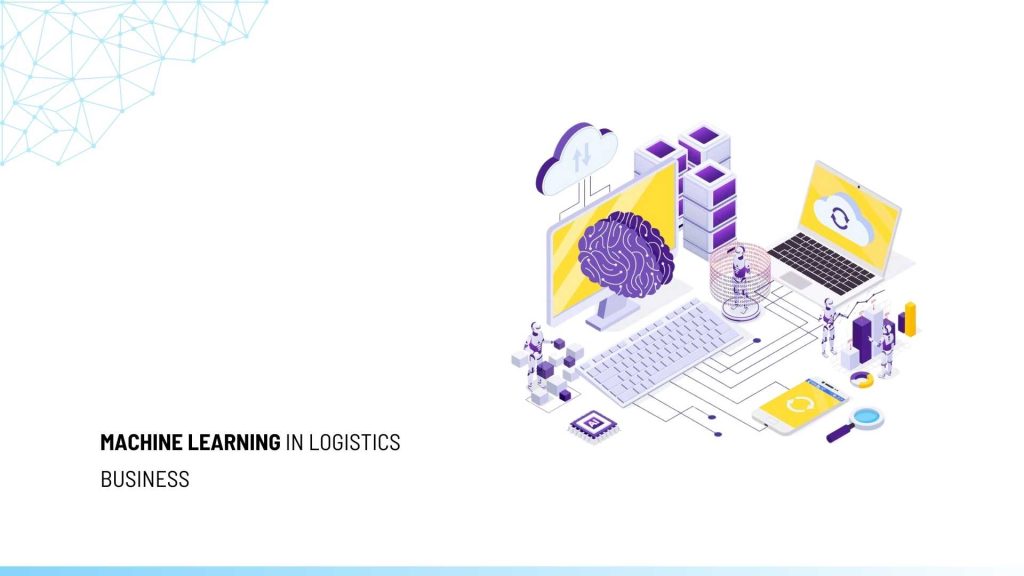The complex and multifaceted logistics industry is the backbone of global trade and commerce. From the movement of goods across vast supply chains to the intricate coordination of transportation and warehousing, the logistics sector faces many challenges in its quest for efficiency and optimization.
In recent years, the integration of machine learning has ushered in a transformative era for logistics, creating a seamless synergy between technology and industry. This powerful combination has revolutionized traditional logistics practices and paved the way for unprecedented automation, predictive analytics, and strategic decision-making.
The synergy between machine learning and the logistics industry is proving to be a game-changer, propelling the sector into new growth. We’ll explore the part of machine learning in logistics and how it drives industry growth.
Optimizing Route Planning and Fleet Management
- Machine learning algorithms analyze historical data, weather patterns, traffic conditions, and other variables to enhance route planning.
- Real-time tracking and predictive analytics enable companies to make informed decisions, reducing fuel consumption and improving overall fleet efficiency.
- Predictive maintenance models can anticipate equipment failures, reducing downtime and maintenance costs.
Warehouse Automation
- ML algorithms help optimize warehouse layouts, reducing travel time and streamlining the picking and packing process.
- Autonomous robots powered by machine learning navigate warehouses, enhancing operational efficiency and order fulfillment speed.
- Predictive analytics aid in demand forecasting, ensuring the right inventory levels are maintained, reducing the risk of stockouts or excess inventory.
Demand Forecasting and Inventory Management
- For accurate demand forecasts, ML models analyze historical sales data, market trends, and external factors.
- Improved forecasting leads to better inventory management, lowering carrying costs and minimizing the chance of stockouts.
- Dynamic pricing algorithms adjust prices based on real-time demand and market conditions, maximizing revenue and profitability.
Enhanced Customer Experience
- Machine learning helps companies personalize the customer experience by analyzing customer behavior, preferences, and feedback.
- ML-powered chatbots and virtual assistants improve customer support, providing instant responses and resolving queries efficiently.
- Real-time tracking and communication keep customers informed about the status of their shipments, increasing transparency and satisfaction.
Risk Management and Security
- ML algorithms analyze data to identify possible risks, such as disturbances in the supply chain or security threats.
- Predictive analytics help companies proactively address potential issues, minimizing the impact on operations.
- Advanced security systems powered by machine learning algorithms enhance cargo protection and reduce theft risk.
Compliance and Regulation
- ML assists in monitoring and ensuring compliance with various regulations and standards in the logistics industry.
- Automated compliance checks and documentation reduce the risk of errors and streamline regulatory processes.
Machine learning is recreating a pivotal role in revolutionizing the logistics industry. From optimizing route planning and warehouse operations to enhancing customer experience and mitigating risks, the applications of ML are diverse and impactful.
As technology continues to evolve, the integration of machine learning in logistics will likely become even more sophisticated, fueling further growth and efficiency in the industry.
Embracing these technological advancements is crucial for companies to remain competitive and meet needs of the current logistics landscape.
Conclusion:
Integrating Acumatica Cloud ERP with artificial intelligence presents a compelling prospect for enhancing the logistics industry. Acumatica’s robust ERP platform and AI capabilities promise to revolutionize traditional logistics processes, offering unprecedented efficiency, accuracy, and adaptability.
The seamless synergy between Acumatica Cloud ERP and AI technologies opens avenues for real-time data analysis, predictive insights, and streamlined operations, ultimately empowering logistics companies to navigate the complexities of modern supply chains with unparalleled agility and precision.
Acumatica Cloud ERP stands at the forefront as the industry embraces this technological fusion, poised to drive innovation and elevate the logistics landscape to new heights.

Vijay comes with a vast experience in ERP and enterprise solutions space with about 20 years of experience in various packaged application like Acumatica, SAP, Orion, Salesforce.com, SugarCRM and, SalesLogix.
















